

Rob-n-Hild, Eastward Ho!
Click links to jump to specific days:
Start | Nerdy
| Largest
| Stranger Things
| Stairs Stairs Stairs
|
|||||||||||||||||||||||||||||||||||||||||||||||||||||||||||||||||||
|
Gros Morne 209 km. 3 hours. Elevation maximum 345 metres) 
|
|||||||||||||||||||||||||||||||||||||||||||||||||||||||||||||||||||
| Things didn't go quite according to plan today. Our original idea was to go on a big hike to the summit of Gros Morne (about 17 k), only the trail is closed at this time of year as when the snow is melting, the plants are very fragile. If there had been more snow we could have done it on snow-shoes , or if the spring had been earlier it would have been OK to walk on by now, but that probably saved the emergency services a trip to bring Rob down on a stretcher so maybe it was a good thing. The next plan was a short walk to a boat tour deep into a land-locked fjord - only when we had walked the 3 k into the departure point the tour was cancelled because of high winds! It was windy today, but it had also been windy yesterday and the tour had gone ahead then, hmmmm. So, Plan C was to drive to the southern part of the National Park and walk the Tablelands trail. This one worked at least - do read on... | |||||||||||||||||||||||||||||||||||||||||||||||||||||||||||||||||||
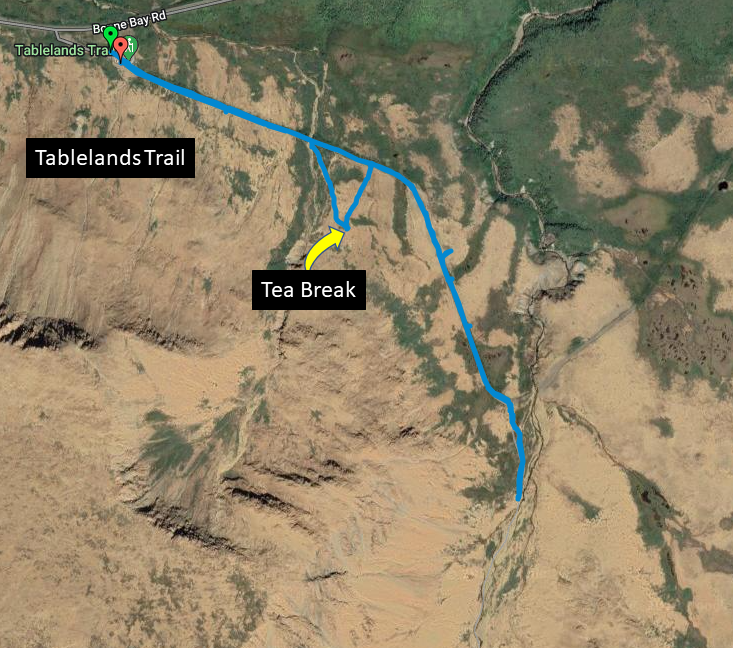
|
|||||||||||||||||||||||||||||||||||||||||||||||||||||||||||||||||||
| It would take too long to explain every thing about this walk, but the bottom line is that this is one of very few places where the earth's mantle is exposed to the surface - usually there are several other types of rock layers as well as soil etc. covering the mantle so you never get to see it like this - which makes Gros Morne really interesting - to geologists anyway! This mantle rock is very high in iron and as this oxidises it turns light brown. Other reactions take place creating very acidic surface water and there is almost nothing that can grow on (or in) it so it stays quite bare. What does happen is some very weird rock patterns a few weird plants dominate and the whole thing looks like another planet. In fact, NASA have been testing equipment here to take on missions to other planets to see how you can detect signs of life! | |||||||||||||||||||||||||||||||||||||||||||||||||||||||||||||||||||
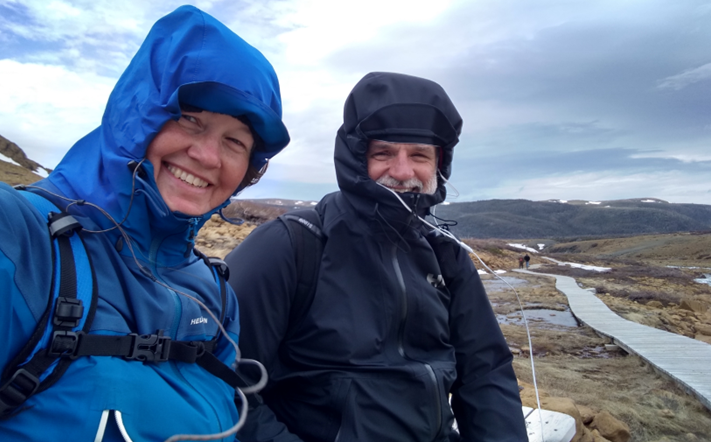
|
|||||||||||||||||||||||||||||||||||||||||||||||||||||||||||||||||||
| For this walk, we had downloaded the Parks Canada self-guided tour onto our phones so we could get useful bits of information while we were walking. Apart from being a very nerdy thing to do, this was really really useful because so much of what makes this particular bit of the park so special has to be explained at ground level. The guided tour included bits of audio and video as well as text and by using your location prompted you to look for things at specific places. And it worked: When you were asked to step off the track to the left to look for a specific type of plant - it was there, or when it said look up to your right to see a certain rock formation - it was there too! The biggest problem we had was hearing the sound because it was sooooo windy that we almost couldn't hear to speak to each other. We had to use head-sets and pull our hoods tight around our faces to cut out the wind. | |||||||||||||||||||||||||||||||||||||||||||||||||||||||||||||||||||
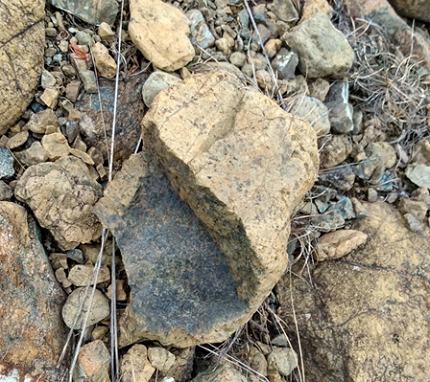
|
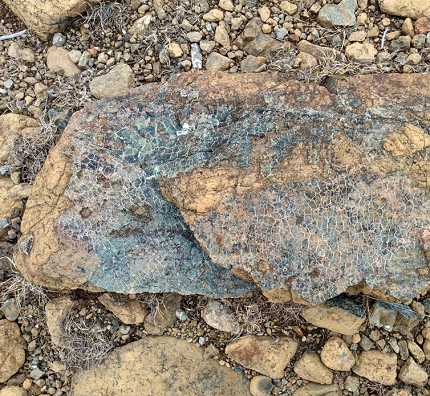
|
||||||||||||||||||||||||||||||||||||||||||||||||||||||||||||||||||
| The main rock is peridotite which has a lot of iron and when exposed to the air it oxidises to the light brown color of most of the terrain. The very dark colour of the un-oxidised rock is seen in the broken pieces. This is a heavy rock as well so must have a lot of iron in it. | Serpentenite is a weird patterning which takes place through a metamorphosis of peridotite wherewWater flows through cracks and calcium comes to the surface. The surface has a surprisingly waxy feel to it. Very weird - it looks like a particularly tough spider web. | ||||||||||||||||||||||||||||||||||||||||||||||||||||||||||||||||||
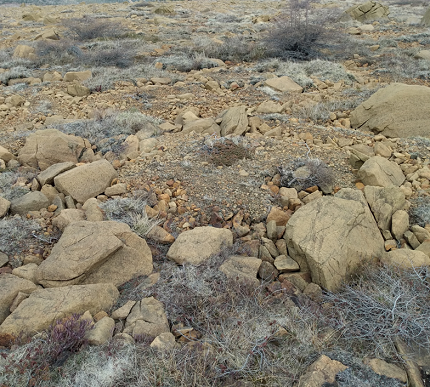
|
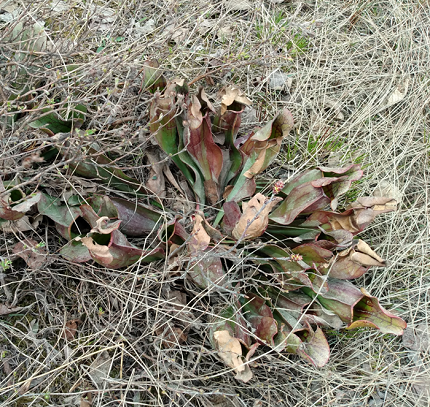
|
||||||||||||||||||||||||||||||||||||||||||||||||||||||||||||||||||
| Frost polygons occurr as small gravel, surrounded by larger rocks. These are formed over time by frost churning or cryoturbation of the soil. Not sure what this means, but these rings can be seen all over the place once you notice them. | One of the few plants to grow here is the carnivorous Pitcher plant - which happens to be the provincial flower of Newfoundland and Labrador! The soils are acidic and have a poor balance of nutrients, so the pitcher plant supplements this with nutrients it gets from small insects that fall into the water held in this pitcher-shaped leaf. I think this works better in the summer as these are very dry and crispy right now. | ||||||||||||||||||||||||||||||||||||||||||||||||||||||||||||||||||
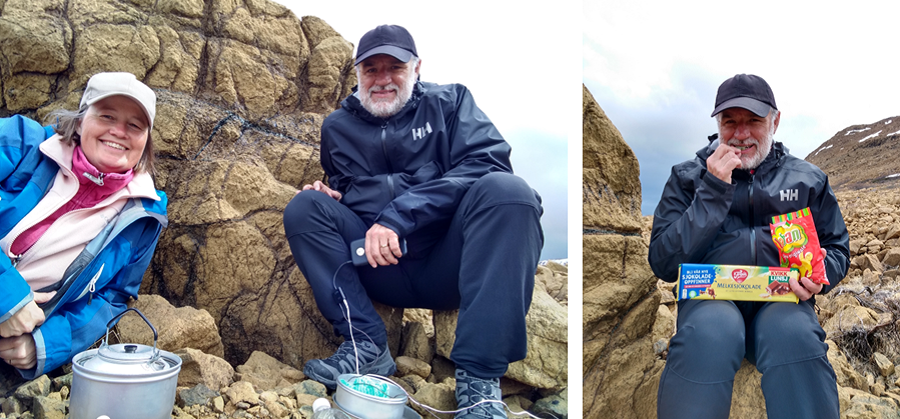
|
|||||||||||||||||||||||||||||||||||||||||||||||||||||||||||||||||||
| We had eaten lunch in the car, but taken the Trangia and tea-making stuff with us to brew up on the way. We managed to find some shelter behind a big rock and enjoyed a nice cuppa together with Norwegian chocoloate and Rob's favourite Seigmen! Well, it was his birthday after all. | |||||||||||||||||||||||||||||||||||||||||||||||||||||||||||||||||||
| Coming up: More Gros Morne - will the boat tour happen tomorrow? | |||||||||||||||||||||||||||||||||||||||||||||||||||||||||||||||||||
Start
| To Previous Day
| To Next Day
| Nerdy
| Largest
| Stranger Things
| Stairs Stairs Stairs
May/June 2023
May/June 2023

